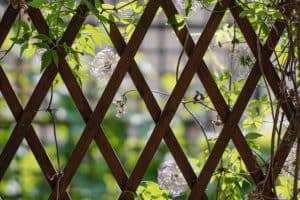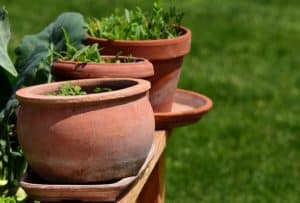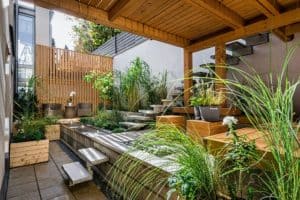Did you know that you can have a killer garden even if you have a very small space? Even if you live in the city you can still have an amazing garden. Today I am going to give you 6 ideas on just how to do that. I am going to give you some “out of the box” ideas on how you can provide a year’s worth of food for your family even if you have very little room.
First of all…
1. Plan smart
Let me start out by saying that you can make the most of your garden if you take the time to plan it out well.
Here are a few steps to help you properly plan your garden…
1. Choosing your Crop
The first step is choosing your crops! This may sound simple. But put a little thought and effort into it. Think about the things that you eat the most of and the things that would cost the most if you had to buy them. If you have to cut things out because of lack of space in your garden make them the things you can get cheaply at the store and plant the things that are more expensive to buy. I personally grow…
- Green Beans
- Tomatoes
- Peppers
- Lettuce
- Spaghetti squash
2. Making Calculations
Now that you know what you want to plant. Make your calculations. Either take the measurements of your current garden or decide how large a garden you will be making. Once you know how big of a space you are working with, draw it up. Almost like a blueprint of a house draw what you want your garden to look like and where the plants will be. Now I understand that there are totally different personalities out there. If this is too much for you just draw something super simple. It really does not have to be that detailed.
But I would encourage you to at least draw up something. It really does help in the planning process. And it will help you to see where things should go. For example, make sure your plants that “crawl” get put on the outside of the garden so they don’t overtake your other plants. I say this from experience 😉
Another aspect when planning is keeping room in between the rows. When you are planning how much space you need I would highly recommend keeping enough room in between the rows for a tiller. You can get a small tiller so the rows don’t need to be that big. But trust me on this one! It will save you SO much time on weeding. And the tiller gets the soil turned up better than we can by hand. This has been a lifesaver for me!
3. Buying the best plants/seeds
Next, you will need to buy your seeds. Now I would recommend getting organic heirloom if you can. You might not know this, but if they are not heirloom you can not use the seeds again and if a plant happens to come back the next year it will most likely not produce. And part of being self-sufficient is not having to continue buying things year after year right? RIGHT! If you can’t get organic heirloom its not the end of the world it is just helpful if you can. If you have amazon prime you can get seeds and have them to your door within 2 days! I highly recommend it!
2. Think Vertical

Do you have a fence in your yard? or maybe a trellis? You can take advantage of that and plant around your entire yard. I mean if you have a fenced in yard you could for example have a years supply of beans just from that! And you have not even used any of your “garden space” yet. How cool is that?
There are also quite a few benefits to grow vertically as well.
- Increased yield
- Better pest control
- It looks pretty
- Create privacy
- Ease of harvesting
So I mentioned growing beans but I wanted to give you a list of different things you can grow vertically.
- Peas of any sort
- Pole beans
- Cucumbers
- Winter and Summer Squash
- Tomatoes
I personally am all for using as much wasted space as possible and turning it into food. I mean why have a perfectly good fence go to waste? or a yard that you have to spend time and money mowing? Why not turn it all into food for your family? Speaking of which next I want to talk about edible landscaping…
3. Edible landscaping
I love a beautiful yard and gorgeous plants around my house but why not use some of that space for food? My house has a huge area around it that is landscaped. I did not know what to plant in it and it was getting overtaken by weeds. So in the burm next to my house, I planted strawberries. The plant is cool looking and how awesome to be able to walk out my front door and have freshly grown strawberries? I would encourage you to take a look around your own house and see if you have a similar situation. Maybe you could even redesign your landscaping to plant some food for next year. A great thing to plant near the house is herbs. So that when you are cooking you can just walk out the door and grab fresh herbs.
Another thing is your yard. Even if you live in the city and only have a tiny yard why not turn most of it into a garden? I mean what is the point of having all grass? You literally just spend money and time cutting it. And for what? Why not have an awesome garden where you can provide for your family?
You could also have pretty planters outside of your house but instead of growing flowers grow food. So many herbs look super pretty and so you can use it as something to look nice but also something that will provide food for you and your family.
Something like this

4. Plant in unique areas
Look around your house and see if there is any other area that you could turn into a garden. Do you have a patio? Put up a trellis and grow some vertical plants. Or make the whole patio into a garden. You will not only create food for your family but also a relaxing area for your family to spend time together.

5. Alternate planting
Another way to make the most out of your garden is to plant multiple times in a year. There are certain plants that do not take as long to grow so once you know what you want to plant you can plan accordingly and plant at least 2 times in the year. I actually have a chart of all the vegetables and how long they take to grow. You can check that out here.
Q & A
I wanted to take a little time and answer a few more questions. And as always if you have one that I missed please leave it in the comments and I will do my best to answer it!
How can I increase my garden yield?
Well, I already mentioned alternate planting and I would have to say that would be your best bet. But there are also others ways to help your garden out. A few of those ways would be…
- Fertilizer
Make sure that you are treating your soil right. Whether you have access to good compost or manure make sure you are doing something to help out your soil. The first year I had my garden it gave me an awesome yield and I did nothing to the soil but every year after the yield has gone down and that is because my soil is getting depleted and I have not done a good job helping the soil. Right now I am working on chicken composting. I will be writing about my experience soon. So keep an eye out for that post!
- Water
I know this is obvious but it is something I often forgot to do. What works well for me is to put a sprinkler in the garden. Then all I have to do is turn the hose on. It is recommended that you water at night or in the mornings as this is “most natural” for the plants. Just make sure that you are not overwatering. I have made this mistake as well. You just want to dampen the soil.
How do you prepare the soil for a vegetable garden?
Like I mentioned the first year of having a garden is fairly easy but whether your garden is new or old I would recommend the following steps…
- Till
Make sure you till your garden before planting. This will get the soil loosened and ready for the seeds.
2. Fertilize
Lay down a layer of fertilizer. If you can get your hands on manure or chicken compost this will be your best bet.
3. Water
I know it sounds odd to water it when there is nothing in the ground but I would get the ground damp before planting. This just helps when it comes time to plant.
What vegetables can be planted in raised beds?
First of all I wanted to take a moment to tell you why I loved raised beds. For starters they are great because you can take care of them so much more easily. You don’t have to bend over as much and you can just sit next to them to take care of them. Speaking of which the care will be much simpler because the weeds will be kept at bay. The watering will also be much less because the soil will be so much better. Why you ask? Well because the soil will not always be stepped on it will be compacted way less. And they will save you if you have soil issues. My garden did great the first few years but this last year the bottom section of my garden is holding water and when we get a lot of rain it will drown my plants. A raised bed is the perfect solution here!
Okay, onto the actual question…To be honest you can grow just about anything in a raised bed. But there are certain plants that tend to excel above the rest.
-
Potatoes
potatoes grow well in raised beds because of the good loose soil. And as I mentioned above you can take so much better care of the veggies in a raised bed so this will obviously result in a better crop. You can also keep the hills taken care of better in a raised bed.
2.Onions
Onion’s do great in a raised bed because their growing season is longer. So since the soil in a raised bed is warmer you are able to start your onion crop sooner in the season. They also like loose moistened soil just like potatoes.
3.Tomatoes
Again, tomatoes like the good well watered soil and will thrive in this environment.
4. lettuce
Lettuce does not do well in soil that is to wet. So the raised bed does a great job with lettuce and leafy greens because it drains so well. Lettuce also does well with the warm soil that you get with a raised bed.
5.Root veggies
Root veggies such as carrots can be very tough to keep up with. The weeds have a way of overtaking the crop. When you put them in a raised bed they will be easier to weed and take care of.
Composting 101
Composting is a huge part of having a successful garden so I wanted to take some time to answer the most asked questions about this subject. As always if I missed a question please feel free to leave your question in the comments.
Can you add compost after planting?
Absolutely! You don’t have to continue to fertilize throughout the year but it will only help to add good fresh soil to your plants. Especially if you see they are struggling a bit.
When should I add compost to my garden?
Honestly, if you have compost you can add it anytime throughout the year. But it is ideal to put it in right before you are going to plant. I have chickens so I am getting compost continuously so I just add it in whenever I have it.
How can I speed up my compost?
If you have your own compost pile that is awesome! My compost pile is currently in with my chickens and they do the work for me. I just have a section in the chicken area where I dump everything and they work through it and make it into compost. So my answer would be if you have chickens to do it that way. They seriously turn it into compost in a matter of days. If you don’t have chickens then just make sure you are keeping it small, and turning it over as often as possible. Seriously though if you have chickens they do all the work for you! It’s the best.
How often do you turn your compost pile?
It is recommended to turn your compost every 3-4 days. But like I said my chickens do the work for me so I don’t even have to think about it. It is a win-win because they have all the benefits of eating out of the pile and then turning it into compost.
What is the ratio of brown to green in compost?
It should be 2:1, green to brown. Just to give you an idea…Green composting items would be things like Grass clippings, kitchen scraps, and things like that. Brown would be wood shavings, leafs, straw Etc.
What should I not put in my compost pile?
I am personally not super picky with what I put in my compost pile, but there are certain things that you should not add to your pile. I have provided a list of things I would suggest you not add to your pile and the reasons why.
1.Large Branches
In theory there is nothing wrong with large branches but the bigger the item the more time it will take to break down. So if you are wanting your compost pile to be more efficient I would suggest that you put smaller items in the pile. If you can you can take the big branches and put it through a wood shaver. This is a great job for your kids. If you do not have a wood shaver then I would avoid adding the branches to your pile.
2. Treated Wood
This one is kind of self explanatory. Treated wood has chemicals in it that you don’t want in your plants.
3.Coffee and Tea Bags
Coffee and tea grounds are great for your compost pile. But you just want to make sure that you remove them from the bag as you don’t want that to be a part of your pile.
4. Cat and Dog Poop
This one might surprise you because you know that you want manure as part of your pile. So why not cat and dog poop? Well cats and dogs can have parasites in their poop and you don’t want that as part of your pile.
I hope this helped in your composting journey! I tried my best to answer the most commonly asked questions!
How to make the most of your garden
Now that we have gone over how to maximize your garden I wanted to give you a few tips for making the most out of what you have…Because obviously if you don’t have a large garden you will want to make the most of what you have, am I right?
1.Plan
Whether you are just planting a garden for the first time or you have put in a garden for years planning needs to be the first thing that you do! I mean you can’t just throw a bunch of seeds in the ground and hope for the best, right? You need to decide what veggies and fruits you and your family enjoy and if you will just be eating them fresh or preserving some for the winter. Personally, I can a lot of the produce from my garden! I love to have my own canned goods for the winter. But I am aware not everyone is able or wanting to can.
2. Put in a fence around your garden!
Thankfully the animals did not totally destroy my garden but I did lose everything around the edge of my garden. I would recommend at least putting in a short fence to keep out the bunnies and small animals. But if you are close to woods you might need a tall fence for deer and such. My garden is at the edge of some tall grass so I usually just get the little animals coming out of the grass.
As I said If you are working with very limited space you want to protect it as much as possible. And if your space is small it should not be hard to put a fence around it.
3. Put enough space in between your rows for a tiller.
Weeding stinks! So a trick my gardening pro neighbor taught me was to plant with enough space in between the rows to fit a tiller through. Now I know this might waste some of the space but it is totally worth it! And If you have a small tiller you do not need to leave that much space. Trust me it will save SO much time.
Depending on the size of your garden this might not be possible. But if you can I would highly recommend it. You will be surprised at how much it will help you. I am not talking about a massive tiller just a small one. If you want to know what I recommend here is a post I wrote.
4. Get the family involved
Get your kids out there! I have little kids so it can be stressful to have them help. I mean half the time they pull out the veggies and not the weeds…But it is so important that we teach our kids about these things. And they need to know responsibility and hard work at a young age. My husband and I want our kids to know where their food comes from and have them know how to raise their own food.
We home-school and this is a great practical lesson for them. I am all about getting my kids outside and away from those screens! I am a little old fashioned and wish those stinking things did not exist…Well not really I can’t live without my smartphone. Anyway, I hope you the best in your garden! I hope you and your family can work together to become more self-sufficient!
5. Preserve your crop
Now I understand that you might not have enough crops to do this. But if you are able to it is a huge help for the family. Having canned fruits an veggies for the year is so great! And if you followed the tips I have provided you should be able to make the most of what you have so you should have enough to can and put away for the winter!
6. Get a head start
You can make mini greenhouses in your house to give your plants a head start. You can do this with old fruit containers or a rotisserie chicken container. This is also really fun if you have little kids in the house. You can make this a special project for them to work on and help them to learn how plants grow!
7. Weed and Water
So I know this seems obvious but I have a tendency to get lazy and will forget to weed and water my garden. And this really does take a toll on the plants. Again, i know that this is common sense but I just wanted to through that out there. If you are like me then you need to set a reminder to water the garden. What I usually do is use a sprinkler for the garden and just turn it on for a few minutes at night. Just don’t forget about it and leave it on. I have totally done this. And As far as weeding don’t get overwhelmed. Something I like to do is work on it for a few minutes a day. And hey if you have a smaller garden this should be plenty to keep up on it.
Final Thoughts
I hope that this was helpful to you and that it gave you some great ideas on how to maximize your garden. But I am just figuring this out along side of you so if you have some ideas that I have not mentioned I would love to hear them. Please leave me a comment with all of your ideas and or any questions you might have that I forgot to address. We are all on this journey together and I love getting ideas from others.
Happy Homesteading!
~Courtney

